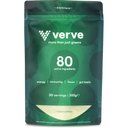Are you craving a better’s night’s sleep or looking to get a grip on anxiety?
Then it may be worth taking a look at the adaptogen Ashwagandha (pronounced ash-wa-gan-da).
Yes, it’s a fabulous-sounding name but then the plant is found in India and other Southern Asian nations. In fact, it’s popularly used in the ancient Indian medical system known as Ayurveda. It’s the plant’s root and leaves that contain all the good stuff.
These are boiled as tea, used as a tincture or ground into powder. It doesn’t have a great taste (the herb is bitter) and which is why it’s best taken in conjunction with other ‘more edible’ berries or fruit in powder form.
‘Smell of the horse’ or ‘Winter Cherry’ – you decide.
In Sanskrit the name Ashwagandha actually means ‘smell of the horse.’ That’s not necessarily a plus point, but it’s also supposed to refer to the herb’s ability to give added strength to whoever ingests it. Other names you’ll find Ashwangandha referred to are ‘Indian Ginseng’ and the rather more edible-sounding ‘Winter Cherry.’
Famously used for calming the body and aiding sleep, the plant has also been prescribed for helping with chronic fatigue, restless leg syndrome and fibromyalgia. It’s also commonly also used for mental clarity.
Its powers come in having the ability to regulate cortisol, a hormone which causes the body stress and, if late at night, insomnia. Balancing stress levels also helps with chronic fatigue, and Ashwagandha is used to improve thyroid functioning. Another study shows it may help athletic performance by boosting cardiorespiratory endurance.
There is also a fertility claim to the powers of Ashwagandha. Certainly, in Ayurveda the plant is used to boost libido in both males and females. But a study showed improved testosterone levels in men, increasing their sperm count. The reason for this is believed to be the cortisol reducing effects of the plant where hormone production was shifted to anabolic hormones, such as testosterone and DHEA.
When can I start to feel better? Like most supplements it can take two to three months of daily use before the full benefits of Ashwagandha are experienced. That’s because it can take time to build up to a recommended amount in the body.
In Verve we carefully measured the amount of Ashwagandha per bottle so that there is enough to have an effect but not too much to cause the body any distress. Too much of the plant, for instance, can lead to an upset stomach or diarrhoea. If you suffer from an autoimmune illness such as lupus or multiple sclerosis then it’s best to avoid Ashwagandha completely.
Find out more
Here at Verve we use Ashwagandha in our mix. When you take the powder and add water you get a drink that doesn’t just contain this adaptogen, but also other herbs and plants which complement each other and work together to help optimise your health. Find out more about the benefits of nutrition supplements at our website.


